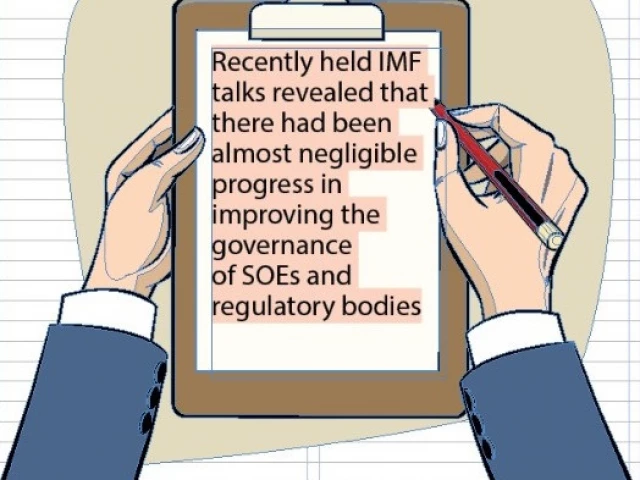ISLAMABAD:
As the first year of the $7 billion International Monetary Fund (IMF) programme comes to an end, the government has failed to bring state-owned enterprises (SOEs) under a new legal framework, breaching its commitments due to resistance from these public sector firms.
The proceedings of a recently held preparatory meeting for the upcoming IMF review talks for the $1 billion loan tranche revealed that there had been almost negligible progress in improving the governance of public sector firms and regulatory bodies, finance ministry sources told The Express Tribune.
They said entities such as the Water and Power Development Authority (Wapda), Pakistan Telecommunication Corporation, and Pakistan Railways were not fully cooperating in amending their laws to separate policymaking from operations.
A year ago, when the IMF board approved the $7 billion bailout package for a period of three years, Prime Minister Shehbaz Sharif’s government promised to address shortcomings in the legal frameworks of SOEs. The idea was to introduce international best practices to stem losses and improve service delivery.
But the government failed on both fronts. It neither improved the legal framework of SOEs nor managed to privatise any entity during the first year of the IMF programme. After completing one year of the programme and receiving $2 billion out of the $7 billion, progress remains limited to fiscal indicators.
Even on this front, despite achieving the primary balance target through higher revenue collection and fiscal adjustments, public debt jumped both in absolute terms and as a share of the economy in the last fiscal year, which is considered a double jeopardy. The debt-to-GDP ratio climbed above 70%, while the debt burden surged to Rs80.5 trillion.
The government had promised the IMF that as part of implementing SOE reforms, it would extend the State-Owned Enterprises (Governance and Operations) Act, 2023, and the SOEs (Ownership and Management) Policy, 2023, to 10 more entities to strengthen performance, transparency, and governance.
These entities include the EXIM Bank of Pakistan, National Bank of Pakistan (NBP), State Life Insurance Corporation, Pakistan Railways, Wapda, National Telecommunication Corporation, Gwadar Port Authority, Karachi Port Trust, and Port Qasim Authority.
Last month, Finance Minister Muhammad Aurangzeb wrote to fellow ministers from the maritime affairs, water resources, information technology and telecommunication, and commerce ministries, urging them to meet IMF conditions by making the necessary legal changes before the IMF team’s visit.
The IMF delegation is arriving in Pakistan and will hold its first round of discussions with the central bank on September 25 – the same date the IMF board approved the loan package a year ago. After discussions with the central bank, negotiations with the federal government will begin from September 29.
Out of the listed entities, two fall under the finance ministry’s administrative control: NBP and Exim Bank. However, instead of amending their laws to address governance issues, the finance ministry has only managed to finalise the Exim Bank draft bill.
Sources said amendments to the NBP Act remain pending until legal changes are made to the Pakistan Sovereign Wealth Fund Act. The government earlier exempted the NBP and six other entities from the SOE Act by placing them under the sovereign wealth fund.
The original deadline to amend the sovereign wealth fund law was December last year, now extended to March 2026.
The IMF has told Pakistan that the sovereign wealth fund should only become operational after governance safeguards for the fund and SOEs are transferred to it, aligning with the new SOE governance framework.
For this, the government will also have to amend the wealth fund Act to clarify its mandate and strengthen governance arrangements, according to the IMF’s latest report.
Sources also mentioned reluctance from Wapda, which has yet to share a draft of the new amendments. These legal changes are necessary to overhaul its current administrative structure, dominated by the chairman of the authority.
The Wapda spokesperson did not respond to a request for comment regarding the delay in making the required amendments, which is in violation of IMF conditions.
Similarly, the Ministry of Information Technology has not shared draft amendments to the Pakistan Telecommunication (Re-organisation) Act, 1996. The Life Insurance Nationalisation Act is still under consideration – not yet approved, while consultations continue on the Pakistan Railways Act of 1890.
However, drafts of amendments to the Port Qasim Authority Act 1973, Gwadar Port Authority Ordinance 2002, and Karachi Port Authority Act 1980 have been finalised but are still awaiting parliamentary approval.

